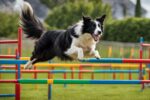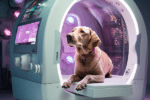Puppy Training 101: Building the Foundations

Welcome to our comprehensive guide on puppy training! Bringing a new furry friend into your home is an exciting time, but it’s important to lay the groundwork for a lifetime of good behavior and companionship. In this section, we will explore the basics of puppy training, emphasizing the importance of starting early, positive reinforcement, patience, and socialization.
Early education plays a crucial role in shaping a well-behaved dog. By starting their training early, between 8 and 16 weeks of age, you can take advantage of their heightened receptivity to learning. This period is when puppies are most open to new experiences and forming positive associations.
Positive reinforcement is the cornerstone of effective training. By rewarding desired behaviors with treats, praise, or playtime, you can motivate your puppy to repeat those behaviors. This approach fosters a bond of trust and encourages your puppy to learn and respond to your commands.
Patience is key when it comes to training your puppy. Remember that they are still developing and learning, so it’s essential to be patient and understanding during the training process. Consistency and repetition are vital, and you should avoid punishment or negative reinforcement, as it can lead to fear and anxiety.
Socialization is another critical aspect of puppy training. Introducing your puppy to a variety of people, animals, and environments early on helps them develop good social skills and prevents behaviors such as fear or aggression towards unfamiliar situations. Taking your puppy to playdates, exposing them to new environments, and ensuring they have positive experiences with handling and grooming are all part of a well-rounded socialization process.
By investing time and effort into your puppy’s training, you are setting them up for a lifetime of good behavior and companionship. Stay tuned for the next sections, where we will delve further into house training, the importance of socialization, and other essential aspects of raising a well-rounded puppy.
Understanding the Basics of Puppy Training
Puppy training is a pivotal step in shaping your furry friend’s behavior and fostering a strong bond. To embark on this journey, it’s essential to grasp the fundamental aspects of puppy training.
Starting Early
Starting early is the key to successful puppy training. Puppies are most receptive to learning between 8 and 16 weeks of age. During this critical period, their brains are like sponges, absorbing information and forming habits. By beginning training early, you set the foundation for a well-behaved and obedient dog.
Positive Reinforcement
Positive reinforcement is a powerful training method that focuses on rewarding desirable behaviors. This approach involves using treats, praise, or playtime as incentives to encourage and reinforce good behavior. By emphasizing positivity, you create a rewarding learning environment for your puppy.
Patience is Key
Patience is a virtue when it comes to training a puppy. Remember, they are still learning and adapting to their new environment. Patience allows you to guide them gently through the training process, offering support and encouragement while they grasp new commands and behaviors.
Socialization Matters
Socialization is vital for puppies to become well-adjusted and confident adults. Exposing them to various people, animals, and environments during their early months builds their social skills and reduces the likelihood of fear-based aggression. Organize playdates and introduce your puppy to different situations and stimuli, ensuring they have positive experiences.
Caption: Socialization plays a crucial role in the development of well-rounded and confident puppies.
House Training
House training is an essential part of puppy training as it teaches your furry friend where and when to eliminate. Establishing a routine is crucial for successful house training. Puppies thrive on consistency, so providing them with a regular schedule helps them understand when it’s time to go outside.
During the initial stages of house training, supervision is key. By keeping a close eye on your puppy, you can prevent accidents inside the house and redirect them to their designated elimination area. Use positive reinforcement to encourage desired behavior. When your puppy successfully eliminates outside, offer treats and praise to reinforce the behavior.
It’s important to handle accidents with patience and understanding. Punishing your puppy for accidents can create fear and anxiety, hindering their progress in house training. Instead, calmly clean up the mess and redirect them outside without negative reinforcement. This approach promotes their learning and understanding.
House Training Tips:
- Establish a routine and take your puppy outside at consistent times throughout the day.
- Supervise your puppy closely, especially during the early stages of training.
- Use positive reinforcement, such as treats and praise, to reward successful elimination outside.
- Be patient and understanding when accidents happen, avoiding punishment.
- Redirect your puppy outside immediately after accidents, reinforcing the desired behavior.
By following these tips and being consistent, your puppy will learn the appropriate place to eliminate, helping them become a well-behaved member of your household.

The Importance of Socialization
Socialization is a critical part of puppy training. It involves exposing your puppy to various people, animals, and environments during their early months to help them become well-adjusted and confident adults. Positive socialization experiences will shape their behavior and outlook on the world.
One effective way to socialize your puppy is through playdates with other puppies or friendly dogs. These interactions allow your puppy to learn proper doggy manners, develop social skills, and practice appropriate behavior during play. It’s important to supervise these playdates and ensure that they are safe and enjoyable for all involved.
Benefits of Socialization
Socializing your puppy has numerous benefits that extend beyond their interactions with other dogs. By introducing your pup to different types of people, places, and experiences, you reduce the likelihood of fear-based aggression and anxiety in new environments. A well-socialized puppy is more likely to approach new situations with curiosity and confidence.
Socialization also helps your puppy develop good people skills. They become comfortable around different individuals, including children, strangers, and those wearing hats or uniforms. This exposure teaches them to be friendly and approachable, which is especially important if you plan to take them out in public or if they will interact with a variety of people in their daily lives.
Another essential aspect of socialization is getting your puppy comfortable with being handled, touched, and groomed. Regular handling and grooming exercises not only promote positive experiences but also reduce stress during veterinary visits and grooming sessions. This familiarity prepares them for necessary care and makes these experiences less daunting in the future.
The Role of Positive Experiences
When socializing your puppy, it’s essential to focus on creating positive experiences. Positive reinforcement, such as treats, praise, and play, helps your puppy associate new situations with positive outcomes. This approach encourages them to welcome new experiences and interact with people and animals in a friendly manner.
Remember, socialization is an ongoing process. Continuously expose your puppy to new environments, people, and experiences to reinforce their positive socialization. Each positive encounter has a cumulative effect, contributing to their overall well-being and ability to navigate the world confidently.

Introducing your puppy to a varied and positive socialization experiences is crucial for their development. It sets the foundation for them to thrive in different environments and with various individuals. By investing time and effort in socialization, you are equipping your puppy with invaluable life skills and ensuring a well-rounded companion.
Conclusion
Puppy training is an essential part of welcoming a new furry member into your family. By investing time and effort into training, you can establish a strong foundation for a happy and harmonious relationship with your puppy. However, training is not the only aspect to consider when raising a well-rounded puppy.
Nutrition plays a vital role in your puppy’s growth and development. Providing a balanced diet with the right nutrients ensures their overall health and well-being. Consult with your veterinarian to determine the best diet plan for your puppy’s specific needs.
Regular exercise is also crucial for a healthy and happy puppy. Physical activity helps burn off excess energy, prevents obesity, and promotes proper muscle and bone development. Make sure to engage in age-appropriate exercises and consult with your veterinarian for advice on exercise routines.
Furthermore, socialization is key to raising a well-rounded puppy. Exposing them to various people, animals, and environments from an early age helps develop their social skills and reduces the likelihood of fear or aggression. Plan playdates, introduce them to different settings, and ensure positive experiences to nurture their confidence and adaptability.
Lastly, consider boarding options for when you are away. As much as we would like to always be with our furry friends, there are times when we need to be away. Look for reputable boarding facilities that provide a safe and comfortable environment for your puppy. Ensuring they receive adequate care and companionship in your absence maintains their well-being and peace of mind.
FAQ
Why is puppy training important?
Puppy training is important because it sets the foundation for a lifetime of good behavior and companionship. It helps prevent unruly behaviors and ensures that your puppy understands your expectations.
When should I start training my puppy?
It is best to start training your puppy as early as possible, ideally between 8 and 16 weeks of age. This is when puppies are most receptive to learning.
What is positive reinforcement?
Positive reinforcement is a training method that involves rewarding your puppy with treats, praise, or playtime when they exhibit desired behaviors. It helps reinforce those behaviors and encourages your puppy to continue behaving appropriately.
How important is socialization for my puppy?
Socialization is crucial for your puppy’s development. It involves exposing them to various people, animals, and environments during their early months. This helps them become well-adjusted and confident adults.
How do I house train my puppy?
House training involves establishing a routine, providing supervision, and using positive reinforcement. It’s important to celebrate successful elimination outside with treats and praise, while also handling accidents calmly and redirecting the puppy outside without punishment.
Why is handling and grooming important for my puppy?
Getting your puppy comfortable with being handled, touched, and groomed is important for their overall well-being. It reduces stress during veterinary visits and grooming sessions, making them more cooperative and relaxed.
What should I consider for my puppy’s nutrition?
Providing a balanced diet with the right nutrients is essential for your puppy’s growth and development. Consult with your veterinarian to determine the best diet for your specific puppy’s needs.
What other aspects should I consider when raising a puppy?
In addition to training and nutrition, regular exercise, socialization, and considering boarding options for when you’re away are important aspects of raising a well-rounded puppy. These contribute to their overall health and happiness.
Source Links
- https://emandmestudio.com/blogs/blog/puppy-training-101-a-comprehensive-guide-to-raising-your-new-puppy
- http://www.petsafetycrusader.com/puppy-training-101-a-beginners-guide-to-getting-started/
- https://www.greenlinpetresorts.com/blog/puppy-nutrition-101-building-a-solid-foundation-for-lifelong-health/





